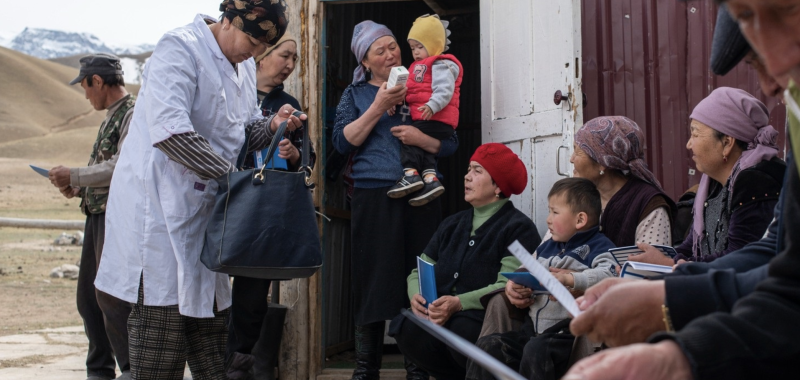
WHO launches first-ever collaborating centre on risk communication, community engagement and infodemic management
Risk Communications
All Regions
The first-ever WHO Collaborating Centre (CC) on Risk Communication, Community Engagement and Infodemic Management (RCCE-IM) has launched at Kristiania University of Applied Sciences in Norway. During a 4-year partnership with WHO, the new CC will conduct high-quality research to help national health authorities and health practitioners on the ground to design timely and effective RCCE-IM interventions during health emergencies.
RCCE-IM is vital for building trust between communities and health authorities, and increasing the acceptance and uptake of protective measures. Public health interventions need data to inform decisions, and the new CC will leverage insights from recent emergencies to support more effective, evidence-based actions that can be rapidly implemented during emergencies to save lives.
A critical milestone in health security
Based at Kristiania University’s School of Communication, Leadership, and Marketing in Oslo, the new centre will focus specifically on supporting RCCE-IM in health emergency preparedness, response and resilience. It joins a global network of over 800 WHO CCs, of which 265 are in the European Region.
Led by Professor Audra Diers-Lawson, an internationally recognized expert in risk and crisis communication, the centre will bridge research and real-world application. Professor Diers-Lawson advised the European Parliament on risk communication during the COVID-19 pandemic and was appointed to WHO’s first-ever technical advisory group on RCCE-IM in 2023. Under her leadership, the centre aims to use practical solutions to advance knowledge and countries’ capabilities in this crucial field.
“Professor Diers-Lawson and her team will support WHO in conducting the right studies and asking the right questions to better understand communities at risk from or affected by emergencies,” said Ihor Perehinets, WHO/Europe’s Regional Emergency Director. “They will help WHO to do this rapidly and rigorously, ensuring a maximum impact on saving lives in an age of permacrisis, with health emergencies, from emerging infectious diseases to climate-related crises, arriving faster than ever.”
RCCE-IM in health emergencies
Recent health emergencies in Europe have underscored the importance of RCCE-IM.
For example, during the COVID-19 pandemic, RCCE-IM practitioners in the Western Balkans and South Caucasus used community insights to shape response efforts, ensuring that interventions were locally relevant and effective. By establishing a feedback and engagement mechanism with community influencers, civil society organizations and vulnerable groups, local authorities were better prepared to translate health information and advice into action. This strengthened public trust in health ministries, improved vaccination efforts and drove innovative cross-platform campaigns.
Similarly, when the European Region became the initial epicentre of the 2022 mpox outbreak, WHO and health authorities co-created interventions with affected communities, ensuring culturally relevant messaging. This approach accelerated response efforts, helping to contain the outbreak and reduce its impact.
Despite these achievements, challenges remain. Emergency responses often prioritize immediate action over structured research, leading to gaps in real-time decision-making. The impact of messaging may not always be fully evaluated, and public health strategies frequently emphasize medical interventions over behavioural and social science research.
Additionally, the rapid evolution of digital communication technology and platforms requires ongoing research to effectively leverage these tools in emergency responses and counteract the spread of false information online.
Addressing gaps and strengthening research
The WHO CC for RCCE-IM will be instrumental in bridging researchers, communities and health authorities to close these gaps. WHO/Europe’s new strategy and action plan for health emergencies, Preparedness 2.0, highlights the need to place communities at the core of emergency response. The centre at Kristiania will contribute by:
- developing valid and reliable rapid response tools to ensure that practitioners get the information they need when they need it to improve evidence-led RCCE-IM interventions;
- delivering innovative digital solutions to streamline the information flow and collaboration between public health experts and scholars for improved RCCE-IM strategies;
- promoting community-driven research to enhance engagement strategies and tailor interventions to different populations; and
- supporting capacity-building for RCCE-IM professionals across countries to ensure that health authorities are well-equipped to implement effective strategies.
Professor Diers-Lawson emphasized the importance of this initiative, stating that “improving public health, community and academic collaboration is fundamental to advancing RCCE-IM and resilience in an era of megacrises. This centre will turn academic insights into action and identify the most effective research for public health emergencies.”
“The launch of this WHO CC is a milestone in strengthening RCCE-IM in emergencies. Delivering health services alone is not enough – people must have access for them to be effective, and that is where RCCE-IM comes in, leveraging science,” said Cristiana Salvi, who leads the RCCE-IM team at the WHO Regional Office for Europe. “Through this collaboration, we aim to connect researchers, practitioners and communities, understand each other’s challenges and find solutions that are both faster and evidence-based.”